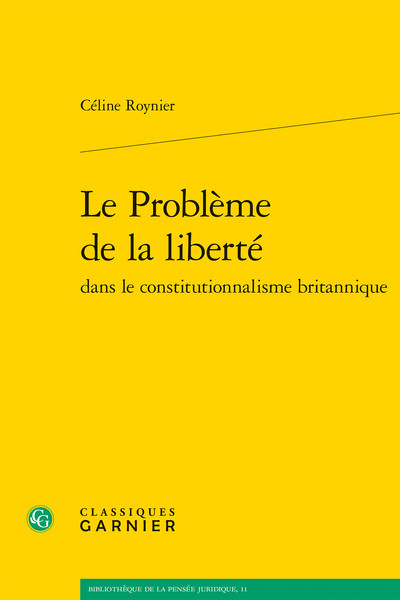
Bibliographie
- Type de publication : Chapitre d’ouvrage
- Ouvrage : Le Problème de la liberté dans le constitutionnalisme britannique
- Pages : 569 à 591
- Collection : Bibliothèque de la pensée juridique, n° 11
- Thème CLIL : 3126 -- SCIENCES HUMAINES ET SOCIALES, LETTRES -- Philosophie
- EAN : 9782406087502
- ISBN : 978-2-406-08750-2
- ISSN : 2261-0731
- DOI : 10.15122/isbn.978-2-406-08750-2.p.0569
- Éditeur : Classiques Garnier
- Mise en ligne : 30/12/2019
- Langue : Français
Annexe II
1. Le Statute du Parlement de Westminster (5 Éd. III ca.9 ; S.R. I, 267)
« It is enacted, that no man from henceforth be atteched by any Accusation, nor forjudged of life or limb, nor his lands, tenements, goods, nor chattels seised into the king’s hand against the form of the Great Charter, and the law of the land. »
2. 25 Éd. III, s5, c.4, S.R. I, 321 :
« Whereas it is contained in the Great Charter of the Liberties of England, that none shall be imprisonned nor put out of his freehold, nor of liberties or free customs, unless it be by the law of the land ; it is accorded, assented and stablished, that from henceforth none shall be taken by petition or suggestion made to our lord the king, or to his council, unless it be by indictement of good and lawful people of the same neighbourhood where such deeds be done, in due manner, or by preocess made by writ original at the common law : nor that none be out of his liberties nor of his freeholds, unless he be duly brought in answer, and forjudged of the same by the course of the law ; and if anything be done against the same, it shall be redressed and holden for none. »
3. 28 Éd. III, ca.3 ; S.R. I, 345
« That no man of what Estate or Condition that he be, shall be put out of Land or Tenement, nor taken, nor imprisoned, nor disinherited, nor put to death, without being brought in answer by due process of the law ».
4. 36 Éd. III c.9 ou s. 9 ; Rot. Parl. II, 269 :
« Primerement, Qe la Grande Chartre, & la Chartre de la Foreste, & les autres Estatutz faitz en son temps & de ses Progenitours, pur profit 564de lui & de la Commune, soient bien & ferment gardez, & mis en due execution, saunz destourbance mettre, ou arrest faire a l’encontre par especial mandement, ou en autre manere. »
5. S.R. I, 382 ; (1363), 37 Éd. III c.18
« ITEM, though that it be ordained in the Great Charter, that no Man be taken or imprisoned, nor put out of his Freehold, without Process of Law ; Nevertheless divers people made false Suggestions to the King himself, as well for malice or otherwise, whereof the King is often grieved, and divers of the Realm put in [Damage] against the form of the Charter ; wherefore it is ordained, that all they that make such Suggestions, be sent with the same Suggestions before the Chancellor, Treasurer, and his Grand Council, and that they find Surety to pursue their Suggestions, and incur the same Pain that the other should have had if he were attainted, in case that this Suggestion be found evil ; and that then Process of Law be made against them ; without being taken [and] imprisoned against the form of the said Charter and other Statutes. »
(The Statutes of the Realm, printed by command of his Majesty King George the Third in pursuance of an address of the House of Commons of Great britain. From original records and Authentic Manuscripts, volume the first, 1810).
6. 42 Éd. III c. 3
ITEM, At the Request of the Commons by their Petitions put forth in this Parliament, to eschew the Mischiefs and Damages done to divers of his Commons by false Accusers, which oftentimes have made their Accusations more for Revenge and singular Benefit, than for the Profit of the King, or of his People, which accused Persons, some have been taken, and[sometime] caused to come before the King’s Council by Writ, and otherwise upon grievous Pain against the Law : It is assented and accorded, for the good Governance of the Commons, that no Man be put to answer without Presentment before Justices, or Matter of Record, or by due Process and Writ original, according to the old Law of the Land : And if any Thing from henceforth be done to the contrary, it shall be void in the Law, and holden for Error.